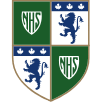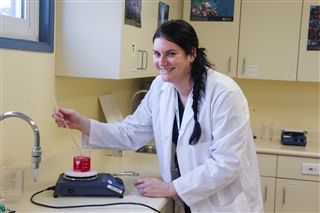What made you want to be part of the GNS community?
I actually found GNS during my search for a job while living in Ontario because I was looking for an IB school. I did the MYP when I was in high school and it really helped prepare me for my graduate studies, and I like the philosophy and pedagogy of it. Then, I learned that Ms. Dallin, who was my colleague during the Canada Wide Science Fair for many years, was also working here! As soon as I started here as a substitute, I loved the community and the students were very welcoming, which convinced me this was the right school for me!
How did you choose teaching as the right career path?
I’ve always wanted to teach, but I thought it’s something I would do much later in my career. After working in research and labs for many years, I wanted new challenges and I went back to school to get my teaching degree. I like the creativity I can have in the classroom and the social aspect of teaching. After being involved in mentoring students and organizing science fairs for over 15 years, it felt like the natural thing to do. Not gonna lie, I also love the flexibility it gives me so I can travel and take more time to visit my family back home.
What is the best thing about your day and why?
It might sound strange, but I really enjoy planning my lessons and finding new science labs and activities to try out with my classes! I love learning about the best ways to teach scientific concepts, especially through inquiry and science projects. The best is when I get to see the students really engaged in an activity and being curious about the topics we are studying.
What are some of your interests outside of school?
I moved from Quebec to British Columbia almost 10 years ago to have access to the ocean and the mountains. I am always looking for opportunities to go camping, hiking and paddling! I also travel as much as I can (16 countries and counting). I’m a very outdoorsy person, but I need to live close to a city as I also enjoy dancing, performing and trying out all the restaurants!
What is something most people don’t know about you?
You might already know that I studied and worked in forensic science before becoming a teacher. When I was in high school, I wanted to become a pathologist and was reading books about anatomy and forensic pathology. My goal was to understand everything about the human body. I started volunteering in an anatomy lab to dissect and prepare cadavers for undergrad courses at my local university when I was 17, after meeting the local anatomy teacher through the provincial Science Fair competition. Seemed pretty strange to some of my classmates at the time, but I have always been really passionate about the subject and it helped me work at the Montreal Forensic Lab and the RCMP National Forensic Laboratories in my early 20s.
What do you like about living/working in Victoria?
For me, it’s the perfect mix between city life and outdoor activities. I grew up in a city a bit smaller than Victoria, but after being in Montreal and Vancouver for a while, I have been enjoying the slower pace of the Island. I feel overall that people are less stressed—I know I am anyways—which I really enjoy.
What do you like about science?
Everything! For me, science is about learning and being curious. As a science teacher, we always need to stay up-to-date with the new research and discoveries. Some of the material we teach in our new curriculum wasn’t even discovered when I went through my science degrees. I love how science is omnipresent in our daily lives, even if we often forget about it.
Do you have a favourite science theory or experiment and why?
I’ve always loved hematology (the science of blood) and everything that it relates to. If I didn’t pursue my studies in forensics, I would have loved to work on hematology-oncology (cancer of the blood cells) research. I know this sounds a bit creepy, but in forensic cases, I always found blood cases fascinating. There is so much that can be found from a few droplets of blood (identity of the donor through DNA, potential diseases, reconstruction of the crime scene based on the physics and directionality of the blood patterns), and the advanced technology used to study it makes it even more interesting. My absolute favourite machine was an infra-red microscope/camera used to detect blood stains on black/dark fabric. In case work, I often detected human blood stains the size of a dot on black shirts that were impossible to see with the eye or a regular high intensity light. Science is amazing!





